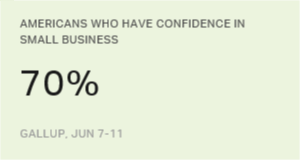PRINCETON, NJ -- Americans' projected average Christmas spending this year, $616, is the lowest in Gallup's 10-year history of tracking this question in its current format, and provides further evidence of the heavy toll the current economic turmoil is taking on America's retailers.
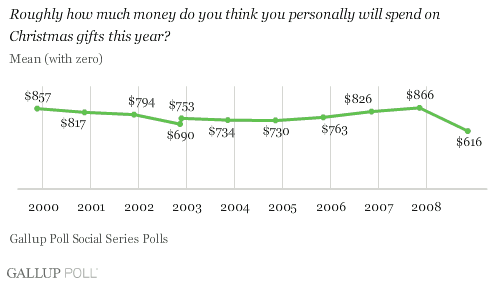
Last year, at approximately this same time in November, Americans' average Christmas spending estimate was $866. The previous low point of the last 10 years came in November 2002 (the year of one of the worst holiday retail seasons in over a decade), when the estimate was $690.
Asked directly whether the amount they plan on spending on Christmas gifts this year is more than, less than, or the same as last Christmas, 46% of Americans say "less," the highest response in this negative category in almost two decades of asking this question.
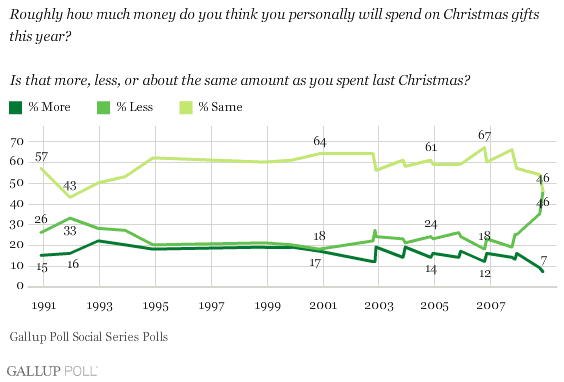
Over the years, Americans have typically said they were going to spend the same amount on gifts as they did the previous year. But the 46% saying this today is low by historical standards, and is only the second time this measure has dropped below 50% in Gallup history.
Another telling indication of the problems retailers are going to face this year comes from Americans' projections of the extent to which they will shop in each of five separate venues: department stores, discount stores, specialty stores, the Internet, and mail-order catalogs. The percentage saying they are very likely to shop in each of these is down at least marginally from last year.
Department Stores
Planned shopping in department stores has taken the biggest hit, going from 53% in 2007 saying they were "very likely" to shop in these to just 39% this year.
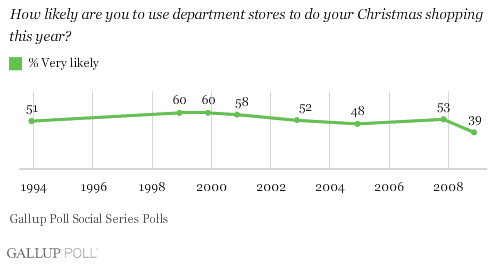
Discount Stores
Analysts have argued that discount stores such as Wal-Mart may be the only winners from the Christmas retail season this year, as shoppers downgrade their shopping aspirations. The new Gallup data show only a slight drop in anticipated discount store shopping: 42% today, versus 45% a year ago. Relative to the other major categories of stores measured in this sequence, discount stores do in fact appear to be better situated than other retailers to weather this Christmas shopping storm.
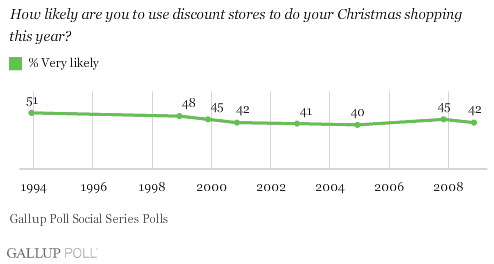
Online Shopping on the Internet
The slight drop in Internet shopping is a surprise, given the basic fact that the prevalence of Internet shopping has gone up each time since Gallup began asking about it in 1998. Because the Internet is a mode of shopping rather than a particular type of shopping (i.e., high-end or low-end), there is no obvious economic reason why use of the Internet for Christmas shopping should drop, other than people's tighter budgets overall.
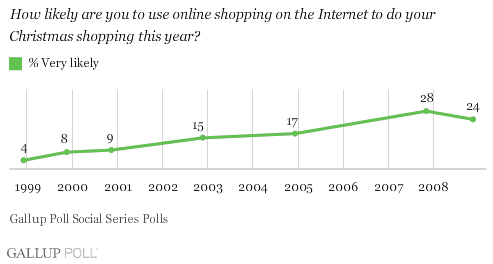
Specialty Stores
The drop in anticipated shopping in specialty stores (which include stores that sell only toys, or clothes, or jewelry) is second only to the drop in department store shopping.
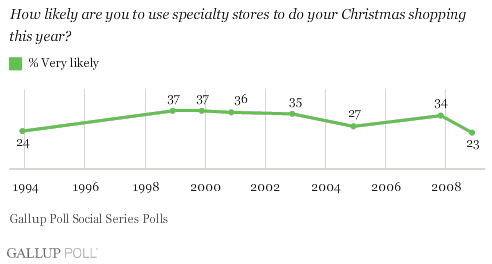
Mail-Order Catalogs
Never a highly popular shopping venue, mail-order catalogs are even less popular this year.
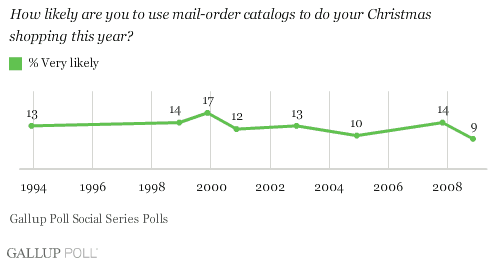
Bottom Line
The drop in anticipated Christmas shopping this year comes as no surprise, given the grim reality of so much other negative consumer economic data Gallup has been measuring. According to Gallup Poll Daily tracking, 60% of Americans now rate the U.S. economy as "poor" and more than 8 out of 10 say it's getting worse, while perceptions of the job market are at an all-time Gallup low.
Still, this latest update of Gallup's venerable Christmas shopping trends reinforces just how vulnerable America's retailers may be this season as consumers pull way back on spending in the face of continuing economic turmoil.
Survey Methods
Results are based on telephone interviews with 1,009 national adults, aged 18 and older, conducted Nov. 13-16, 2008. For results based on the total sample of national adults, one can say with 95% confidence that the maximum margin of sampling error is ±3 percentage points.
Interviews are conducted with respondents on land-line telephones (for respondents with a land-line telephone) and cellular phones (for respondents who are cell-phone only).
In addition to sampling error, question wording and practical difficulties in conducting surveys can introduce error or bias into the findings of public opinion polls.
